
22 minute read
Changemaker Award
The Changemaker Award is a puzzle piece, and each piece of the puzzle represents the highest award a Girl Scout has earned for her grade level. Girl Scout Juniors who have earned their Bronze Award received the Bronze Award patch. Girl Scout Cadettes who have earned their Silver Award received the Silver Award patch. Girl Scout Seniors and Ambassadors who have earned their Gold Award received the Gold Award patch. If a Girl Scout earns all three awards, she receives the final Changemaker patch.
Gold Award Girl Scouts Change the World
Advertisement
Gold Award Girl Scouts are changemakers. They have changed the world, changed their lives, and earned the most prestigious award in Girl Scouting.
To earn the Gold Award, a Girl Scout identifies an issue in their community, drafts a plan to address a root cause, and leads a team of volunteers to implement it. When the project is complete, the Gold Award Girl Scout and their team have made a sustainable impact on the world that continues to last beyond their involvement.
It’s a huge accomplishment that also impacts the Gold Award Girl Scout as a person. How they see the world—and how the world sees them—is forever changed.
Many thanks to the dedicated volunteers who serve on GSCCC’s Gold Award Committee.
Diana Behling
Trish Armstrong
Mary Ellen Fentress
Taryn Marie Jenkins
Cheryl McGrenra
Cathy Six
Susan Ramsland
Ann Stenberg
Gold Award Girl Scout
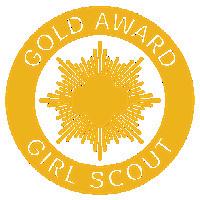
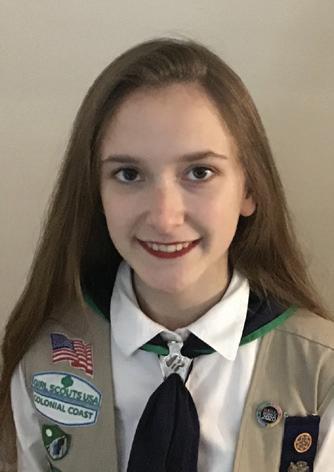
Jasmine Barbour-Bassett
IRM, Williamsburg, VA
R.E.A.D. (Redifying, Environmental, Attitude, Development)
When Jasmine learned that Americans generated more than 35 million tons of plastics in a year—about six times the weight of the Pyramid of Giza—yet less than nine percent of that plastic was recycled, she asked herself what she could do to make a difference. She had always followed the good practice rules of “recycle, repurpose, rethink.” The inspiration behind Jasmine’s journey to inform her community and the world about recycling began when she was in the fifth grade and started a recycle club at school. Her interest in the issue has only grown over the years.
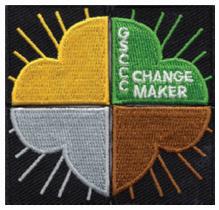
Jasmine took action with her project, “R.E.A.D. (Redifying, Environmental, Attitude, Development)” which included the writing and illustration of a children’s book, “I Can Change the World and So Can You!” that teaches children about the importance of recycling and ways they can take charge of reducing their own environmental footprints.
She also held a STEM event in partnership with the Williamsburg Regional Library and invited many area nonprofits and earth-friendly businesses to display, such as the Chesapeake Bay Foundation and ASK HR Green. The event brought awareness to the issue and to the availability of her book for educational purposes.
“Instead of throwing everything away in the trash so it will end up in a landfill, you can recycle many things so they can become new products. Recycling reduces waste and helps save natural resources such as wood and water. You can feel good about helping the environment when you recycle because you’ll be saving energy and reducing pollution.”
Gold Award Girl Scout Rachel Blythe


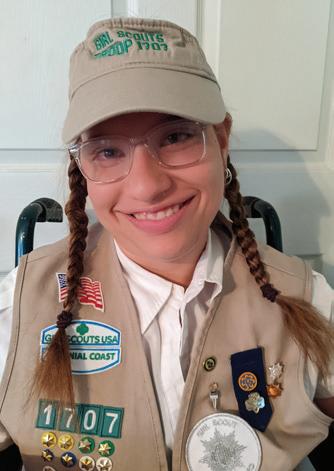
Troop 1707, Franklin, VA Veterans Awareness Day
For her project, “Veterans Awareness Day,” Rachel hosted a public event at VFW Post 4411 in Franklin, Virginia, with the mission of connecting the community with resources that they can utilize to assist friends and loved ones as they overcome the effects of traumas related to military service.
She invited guest speakers from the community to acknowledge and share information about mental health crises affecting Veterans such as PTSD, substance abuse, and suicidal thoughts. PTSD is slightly more common among Veterans than civilians. At some point in their life, 7 out of every 100 Veterans (or 7%) will have PTSD. In the general population, 6 out of every 100 adults (or 6%) will have PTSD in their lifetime. PTSD is also more common among female veterans (13 out of 100, or 13%) versus male Veterans (6 out of 100, or 6%).
Volunteers from VFW Post 4411 and The Church of Jesus Christ of Latter-day Saints, also in Franklin, helped make the event a success. She also designed and produced handouts, magnets, and business cards with hotline and support group information for guests to take home and share with others after the event.
“My granddad is a veteran and I know many veterans are suffering due to the traumatic effects of war. Veterans and their families and friends may be too proud, angry, or hurt to seek help. Sometimes they just do not know where to go for help.”
Gold Award Girl Scout Victoria Burleson


Troop 52, Moyock, NC Mustang’s ‘FUN’damental Library
While doing research on the impact of the pandemic, Victoria became aware of its effects on literacy rates. During the pandemic, schools were closed and so were the school libraries. Many children fell behind in reading and couldn’t meet the expectations for their grade level. Roughly 35,000 third graders in North Carolina were ultimately ‘retained,’ which meant they took another year of third grade or were advanced to fourth grade but put in a transitional class or classified as retained for reading.
She decided to take action through her Gold Award project, “Mustang’s ‘FUN’damental Library.” Her goal was to make reading more accessible for the students at Shawboro Elementary School.
Victoria took action by creating a literacy box outside the school, which is accessible by students and the community and encourages visitors to give and take books. The box is stocked with books for school-aged children and contains over 100 titles at any given time. Book donations came in from the community, along with Victoria’s friends and family, and will continue to be fulfilled by future book drives at the school. Along with book donations, this project was supported in part by proceeds Victoria earned from participating in the Girl Scout Cookie Program!
“In my county, 5 of the 6 elementary schools classify as Title I Schools. To be a Title I school, your school must have a poverty rate of 40% or higher. Often, parents cannot buy extras like storybooks. Even though the schools and staff try very hard to make sure students have what they need to reach the next grade level, lots of kids fall behind.”

Gold Award Girl Scout

Page Henry
Troop 5357, Suffolk, VA Mental Health Help

The mental well-being of teens is a growing concern. The United States is experiencing an extreme teenage mental health crisis. From 2009 to 2021, the share of American high school students who say they feel “persistent feelings of sadness or hopelessness” rose from 26 percent to 44 percent, according to a new CDC study.
Page chose to address mental well-being in her community. She created the Mental Health Awareness Club at her high school, Nansemond-Suffolk Academy, with a goal of offering a safe space for students to learn how to talk through the academic and athletic pressures they face. The club empowers students to educate one another, and their communities, and to create a culture of peer support within their schools.

The Mental Health Club held bi-monthly meetings, facilitated by student members with support from school coaches and counselors. Through practicing role-play activities, stress-reducing techniques, and other healthy coping skills, club activities helped improve the quality of life for students at Nansemond-Suffolk Academy. The club continues to be active and is a volunteercoordinated effort by students. As an outreach effort, the club recently organized a sports and mental health event open to all students at the school to raise more awareness about the availability of the club and the issue.
“An estimated 31.9% of today’s young people experience some form of anxiety disorder, according to the National Federation of State High School Associations. My Gold Award project aimed to address the issue of mental health in student athletes. Student athletes face pressure in the classroom and on the field or court and I want coaches and parents to be aware of the stress they put on their players. Some students may think they are the only one feeling stressed or overwhelmed and do not know how, or when, to ask for help.”
Gold Award Girl Scout Asia Hill

Troop 5778, Chesapeake, VA In the Eyes of a Minority


Asia was inspired to take action in her community through her project, “In the Eyes of a Minority.” When her school district, for the first time, offered an African American studies course, she decided to register. However, due to low enrollment, the course was canceled. Asia was surprised by the lack of interest in the course and began to do some research.
She found a study from the National Museum of African American History and Culture and Oberg Research which reported that, on average, only eight or nine percent of history class time in US schools is devoted to Black history. Studies also show that students who are not African American who learn about African American history understand and appreciate the contributions of African Americans, which is crucial for building an accepting, more cohesive, and inclusive community.
To address the issue locally, Asia created workshop lessons about African American history and used them to teach her peers during lunch periods and over the school’s morning announcements. She surveyed peers and staff in attendance to determine the effectiveness of her sessions and to gain feedback for improving upcoming workshops. The project inspired her school’s student body association to continue offering workshops and doing special announcements!
“As I started my project, I was a little nervous but there was nothing to be nervous about. Most of the students welcomed my project with open arms, and many teachers helped me with my lessons and guided me through public speaking. Thanks to them, I gained the confidence I needed to keep going.”
Gold Award Girl Scout


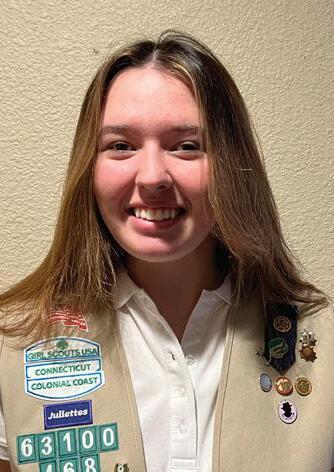
Emerson Hundley
Troop 468, Virginia Beach, VA
St. Michael’s Pantry
More than 50 million adults, kids, and families in the U.S. are experiencing food insecurity in our nation. In 2018, more than 1 in 10 households in Hampton Roads experienced food insecurity. That number has only increased since the start of the COVID-19 pandemic. This is a sensitive but very important “take action” issue for Girl Scouts across the country and one that Emerson chose as her Gold Award project. She took action to tackle the prevalence of food insecurity in her own community through her project titled, “Saint Michael’s Food Pantry.”
Emerson set a goal of reorganizing and revitalizing a pre-existing food pantry at Saint Michael’s Lutheran Church in Virginia Beach with new ideas designed to offer simplicity of access and dignity to guests. Throughout the process of reestablishing the food pantry, Emerson worked with the Foodbank of Southeastern Virginia & Eastern Shore and the Interfaith Alliance to identify latest industry “best practices.” Her goal was to make the food pantry accessible to the community, but manageable by the church who had space but needed a plan. So, she worked with the church’s outreach ministry to make that happen. She also coordinated with other churches who hosted food pantries to ensure there were no overlaps in hours, so people have options on multiple days of the week. The plan she created included a shopping experience that is similar to a typical grocery store experience where guests are given a shopping bag and are able to browse the “store” and select items of their choosing, at no cost to them!
“Food insecurity is a real issue in Virginia Beach and communities everywhere. Especially due to the lasting effects of the pandemic, people are trying to feed a whole family on one income, but still may not qualify for state assistance. We (Saint Michael’s Lutheran Church) had a food pantry before the coronavirus, but it stopped and had not been restarted, yet.”
Gold Award Girl Scout Ash Keller


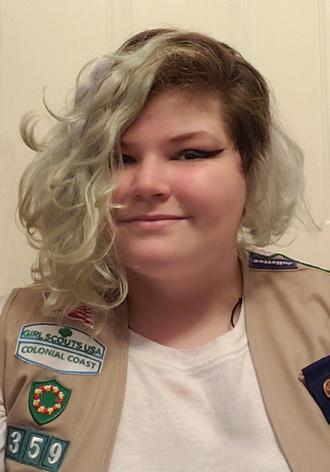
Troop 359, Chesapeake, VA Adogable!
As a strong supporter of the Chesapeake Humane Society (CHS), Ash wanted to dedicate her Gold Award project to helping the animals served by CHS. She knew that the athletic challenge of an agility course keeps dogs fit, helps prevent obesity, increases endurance, and strengthens their bones and joints. Plus, an agility course exercises a dog’s mind, giving them opportunities to learn and solve problems.
Ash felt that an agility course would be something that dogs served by the Chesapeake Humane Society could benefit from. She took action to make it happen and planned and implemented a project titled, “Adogable!”
She found construction plans on the Internet and designed some on her own. With some help from her family, she set about building the equipment. Ash used PVC pipe and wood to build the course equipment. During the course of the project, she learned how to work with tools and some basic carpentry skills.
In addition, Ash collected 500 pounds of plastic bags through the Trex Recycling Program to receive a bench, which she placed in CHS’s garden! A ribbon-cutting ceremony was held where Ash thanked the Chesapeake Humane Society’s Community Engagement Coordinator Shoshana Mostoller for her mentorship. The course will be maintained and used by community volunteers.
“I knew that I wanted to do something for the dogs at the Chesapeake Humane Society because I’ve always loved animals. I also love art and design. So, I came up with the idea for an agility course and made a list of obstacles I could create and build. Plus, I wanted to bring awareness to the shelter dogs and provide them with an outlet for their energy. Seeing the dogs interact with the course has been so rewarding! The other good thing about the agility course is that the dogs learn basic obedience and it helps the dogs to get adopted quicker.”
Gold Award Girl Scout


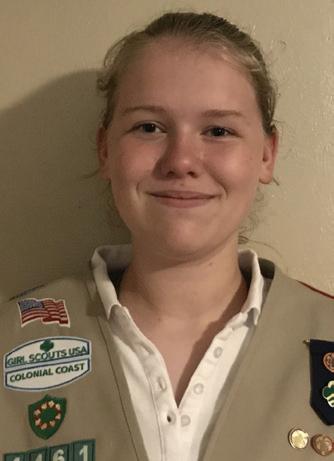
Katie LaLonde
Troop 4161, Chesapeake, VA Girls in the Outdoors
When there’s an opportunity to camp or get outdoors, Katie is all over it. She loves all things in Girl Scouting, especially in nature. For her project, “Fun in the Outdoors,” she focused on the activity of geocaching. The word combines the prefix geo, meaning earth, with cache, which means hiding place, and today, there are more than 3 million caches worldwide! It is affordable, family-friendly fun in the outdoors with the excitement of a scavenger hunt. With geocaching, you can also place “travel bugs” in the cache which allows it to be placed somewhere else once found. Using a QR tracker, you can see all the places the “bugged cache” has been.
Katie placed geocaches, including “bugged caches” at Chesapeake locations that included: Northwest River Park, Indian River Park, Centerville Park, and Oak Grove Lake Park. She then invited the community to discover geocaching by placing flyers in the parks with step-by-step instructions about how to set up a free geocaching app and how new users could get started having fun with this outdoor/STEM hobby. Each cache has an educational theme that keeps those involved interested. She also created geocache maps that the park offices agreed to give out.
Katie’s caches included small trinkets inside a case which listed their GPS coordinates online. In all, Katie created 20 caches over the four sites. She promoted her geocaching opportunities through flyers that she placed on social media using Instagram and Facebook, as well as placing print flyers at locations such as churches and libraries in Chesapeake.
“There are few outdoor activities that don’t cost money and that are easily accessible to families. It is important for people, especially kids, to get out and move because obesity rates are on the rise. Geocaching creates opportunities for people to get out and move while having fun. We also made some of the geocaches accessible by placing them near the roadway or sidewalk for those who use mobility aids.”
Gold Award Girl Scout Riley LeBlanc

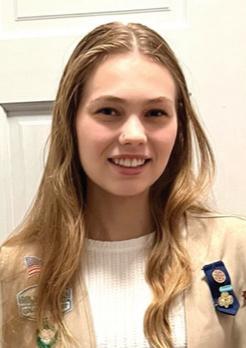
Troop 293, Virginia Beach, VA Period Power
When doing research, Riley found that period poverty— defined as a lack of access to menstrual products, hygiene facilities, waste management, and education—affects many women globally, causing physical, mental, and emotional challenges. The stigma that shrouds periods further prevents individuals from talking about it. Period poverty, like other forms of poverty, can be debilitating.

Through her project, “Ending Period Poverty,” Riley set a goal of supporting women in need who suffered from this dilemma. She worked with the Virginia Beach chapter of Days for Girls, an organization which serves to advance menstrual equity, health, dignity and opportunity for women around the world by providing healthcare, feminine products, and education. She managed two Days for Girls workshops as well as an Amazon wish list supply drive where she collected new underwear and period products. Riley also created a Girl Scout patch program for Girl Scout Juniors (girls in grades 4-5) to learn about reproductive health and provided access to service ideas for other Girl Scouts to help end period poverty locally.
The project was a large success and she was able to donate nearly 700 pairs of women’s underwear to Days for Girls and the Samaritan House in Virginia Beach along with an additional 300 feminine care products.
“During the workshops, we sewed 138 transport bags and put together 61 Days for Girls kits to send to Ukrainian refugees. The first workshop took initiative to sew the transport bags. The second workshop assembled the kits using the transport bags we made, products donated, as well as an inventory of reusable liners and shields from that Days for Girls Virginia Beach Chapter.”
Gold Award Girl Scout Morgan Lynch

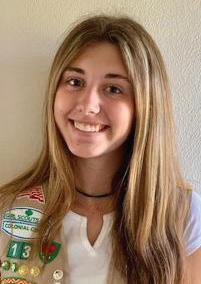
Troop 13, Virginia Beach, VA The Ability Garden
Morgan has been helping to make the world a better place through community service since joining Girl Scouts as a Girl Scout Daisy. She has provided many services for the children at St. Mary’s Home in Norfolk over the years, including a project to earn her Girl Scout Bronze Award. It was only natural that she chose to continue to focus on helping the residents of St. Mary’s Home for her Gold Award Project, “The Ability Garden.”

She created indoor and outdoor learning features, themed around gardening, for the residents. Her goal was to provide creative and accessible learning experiences that incorporated her love for the outdoors. She took action by making four ADA-approved raised garden beds, as well as a sensory play box for mobile residents to explore and learn new skills, all on the grounds of St. Mary’s Home. She also created an indoor succulent garden, built on a rolling cart for residents who are unable to get outdoors, and wrote and published a book on the use of herbs from the garden. This project required her to create detailed plans, purchase equipment, build and paint garden boxes, and then do the planting, as well as teaching how to care for and use the garden.
“Gardening typically requires fine motor skills, the ability to get down on the ground and knowledge of plants, herbs, and tools. Often, people with special needs are excluded from participating in certain experiences. I wanted to specifically address the issue of gardening and how adapting to the residents’ needs can improve their physical, social, and mental well-being.”
Gold Award Girl Scout Natalie Neace



Troop 1659, Yorktown, VA
Steps Towards a Healthy Heart and a Healthy Lifestyle
Natalie is well aware of the importance of a hearthealthy lifestyle. She has lived with a heart condition that has required her to be very mindful of her diet and the need to exercise.
For her project, “Steps Towards a Healthy Heart and a Healthy Lifestyle,” Natalie set out to educate the youth in her community about the risks of living an unhealthy lifestyle and ways to lead a heart-healthy life. To accomplish this, she developed a curriculum geared towards 4th-8th graders which details MyPlate, an FDA-approved balanced eating guide, and created fun, follow-along exercise videos. She also designed and developed her own Girl Scout patch and program, named Heart Health Awareness, to go along with the activity booklets as an indication of completion.
As part of the project, Natalie presented the curriculum to 4th-8th grade campers at Victory Family YMCA’s summer camp program in Yorktown, Virginia. She delivered the program over two sessions and guided the students through her Heart Health Awareness patch program and the follow-along videos.
Along with the summer programming at Victory Family YMCA, she also delivered her curriculum packets to three other area childcare facilities, where the program was presented by their staff.
Gold Award Girl Scout Brianna Orosco


Troop 365, Currituck, NC
Poaching Posterity: How the Illegal Wildlife Trade is Destroying Global Sustainability
When Girl Scout Ambassador Brianna Orosco learned about exotic wildlife trafficking as part of her volunteerism at the Virginia Zoological Park and through wildlife conservation social media, she felt the need to take action and to be a wildlife advocate. She did this by creating a Gold Award project, “Poaching Posterity.”

With her interest in the topic and research she had done, Brianna partnered with the zoo to develop a curriculum for kids who attend camp. She also created slides to add to the zoo’s camp staff training that shows pictures of jewelry and other items that are made from poached material. To complete the project, she produced a short documentary about the project in collaboration with film students at Regent University. A workshop was also conducted for younger Girl Scouts on the subject at A Place for Girls.
Activities in the curriculum are designed to be fun, to bring this challenging and controversial subject to life in a way that girls can really enjoy and understand. Using creativity and the power of storytelling, Brianna’s project inspires others with the wonder of the wild world, encouraging and nurturing a conservation-conscious generation who will ensure its survival!
“This is difficult subject matter, and I think a lot of people shy away from talking about it,” she said. “But it’s important for kids today, as the next generation of environmentalists, to find solutions to problems that exist in our ecosystem. Sometimes it feels like the problems facing our planet and our amazing animals are too big, but, when each of us does what we can to help, we can have hope.”
Gold Award Girl Scout Brielle Peltonen


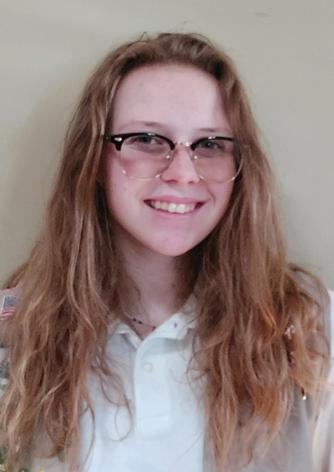
Troop 279, Virginia Beach, VA Backyard Recreational Area
Brielle loves the outdoors and gardening. She knows that being in the outdoors with family and friends was so important to her during the pandemic, and she wanted to use what she learned from that period to plant the seeds of friendship through an outdoor venue. For her project, “Backyard Recreational Area,” she improved an outdoor space at Coast City Assembly of God in Virginia Beach.
Brielle created an inviting outdoor venue for the congregation’s use. Her goal was to create a space where picnics, youth gatherings and social events could be held.
While planning to carry out the project, Brielle realized she would need volunteers. She enlisted the help of her family to build and install eight picnic tables, a fire pit, eight benches, and a gaga ball pit! The purchase and collection of supplies, and the building of the outdoor furniture and game structure required some hard labor and many hours. To encourage the use of the outdoor space, she planned and offered an opening event and invited the entire congregation. She led the fun in the gaga pit and also taught how to safely start a fire.
“My Gold Award’s main focus was to not only utilize the incredible outdoor space the church has in the backyard, but to also repair many social relationships that may have been lost over the COVID-19 pandemic. It was also an opportunity for me to learn new skills, like learning to use power tools!”
Gold Award Girl Scout Trinity Pittman


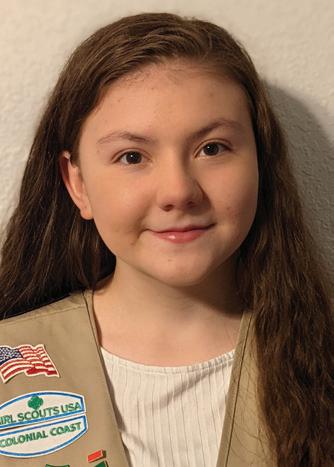
Troop 52, Moyock, NC Maple Dog Park Agility Equipment
Trinity decided on her project after realizing the Maple Dog Park in Barco, NC, did not have any exercise equipment for dogs. She knew agility equipment is important for dogs to sufficiently release energy and learn new things, such as how to swerve around weave poles and go up and down A-frames. Using agility equipment also leads to more obedient dogs. The dog agility equipment will not only provide much needed exercise for the dog’s body, but for the mind. Other benefits of a dog exercised at the park include building stronger social skills and bonding with their owner.
She worked with the Parks and Recreation Department, the Currituck Animal Shelter, a retired dog agility trainer, the owner of the agility course at Family Dog Club as well as many wonderful community members to plan and build the agility course. Trinity added a “take a ball, leave a ball” station along with an A-frame agility jump, a tunnel, and weave poles to both the small and large dog areas of the park.
She held an opening ceremony in September 2022 to unveil the additions to the park that friends from the community – some with paws – attended!
“I was happy to welcome The Currituck Animal Shelter and For Pitties Sake to the opening of the Agility Course, so they could help spread the word about this new addition in the community. The businesses PetWay, Bone to Pick Barkery and Boutique, and Moyock Animal Hospital set up tables at the event and Care-a-Lot donated treats, toys, Frisbees, coupons, and other dog items for attendees. There was a lot of community spirit!”
Gold Award Girl Scout


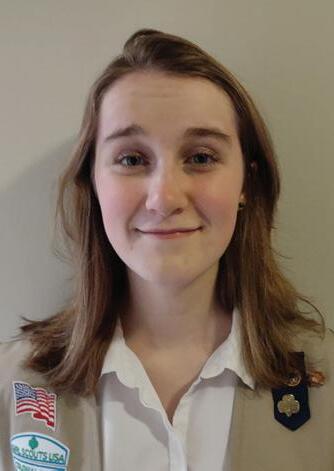
Anna Ross
Troop 759, Chesapeake, VA Beautification of Bells Mill Park
Using resources wisely and making the world a better place is an essential part of what it means to be a Girl Scout, and Ann supports this whole heartedly. She is a champion of the environment and earned her Gold Award by carrying out a project, “Beautification of Bells Mill Park,” where she spearheaded an effort to make the world a better place! This public park located in Chesapeake near Chesapeake Civic Center, features paths through wetlands and meadows alongside the Elizabeth River. The park was previously a landfill, and now serves as a historic site and recreational space for the community to enjoy.
Anna’s first steps involved coordinating with the city’s department of parks, recreation, and tourism to understand the challenges the park was facing and to offer solutions that would have a lasting impact. Anna agreed on a multi-step approach that would pay homage to the park’s history as a landfill, while making the site more accessible and environmentally friendly. As maintenance of the park, city grounds staff had to regularly mow nearly 40 acres of land in the eastern section of the park. With Anna’s help, a plan was created to decrease the amount of mowing needed at Bells Mill Park through the planting of a wildflower meadow. With the wildflower pathways effort, there were many benefits: community involvement improved, there was an increase in the number of pollinators at the site, and a decrease of the amount of fossil fuels needed to maintain the park. Anna also added colorful trash cans.
“I also did a week-long campaign at my school, Grassfield High School, where I did morning announcements to students and shared facts about pollution and its global impact. I enjoyed making posters as part of the campaign, too, and used themes like “Pollution Day” and “Save the Turtles Day.”
Gold Award Girl Scout


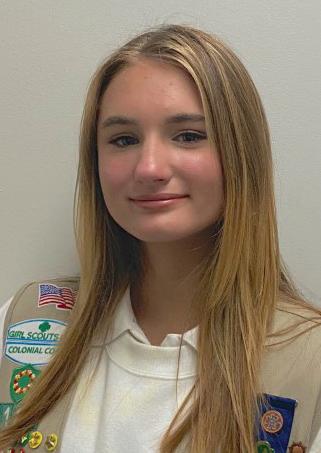
Sydney Sheffield
Troop 4161, Chesapeake, VA
Norfolk Botanical Garden Bluebird Box Project
After becoming aware of the shrinking availability of habitats for native species, like the Eastern Bluebird, in the Hampton Roads area and beyond, Sydney organized a plan and took action to improve the livelihood of those affected species through her project, “Norfolk Botanical Garden Bluebird Box Project.”
Eastern Bluebird populations plunged in the early 20th century, when non-native House Sparrows and European Starlings were introduced into the United States. Both of these invasive species are also cavity-nesters and much more aggressive than bluebirds, so they quickly took over suitable nest cavities and habitats.
Sydney identified specific sites to install bluebird boxes at Norfolk Botanical Garden (NBG) in cooperation with Theresa Augustin, NBG’s Director of Environmental Engagement & Outreach. After identifying sites, she set about properly designating these locations based on Garden guidelines. She then built and installed three bird boxes along the trails of NBG along with informational signage about the project and how individuals can get involved on their own.
“My project addressed the declining population and nesting habitats of the Eastern Bluebird. A combination of factors has led to this decline in population. They have lost their habitat due to land development, removal of dead trees and people using metal fence posts rather than wooden ones. Nesting habitat loss began increasing due to the introduction of two non-native species, the European Starling and the House Sparrow. They chase the Eastern Bluebirds away from nesting sites and take them over.”
Gold Award Girl Scout Lauren Simms



Troop 759, Chesapeake, VA Kids Korner
Lauren’s project, “Kids Korner,” was dedicated to creating an after-school learning space and providing educational materials to the students of the Boys and Girls Club of Southeast Virginia in Chesapeake. She discovered that during the pandemic many students experienced learning challenges, and not all students had access to what they needed in regard to learning environments. Lauren identified the need for the availability of additional reading resources, mathematical resources, and homework help outside of the classroom, and completed this project to address those needs for elementary-aged students in her community.
Lauren designed, built, and installed a dedicated space for students in the after-school program at the Boys and Girls Club of Southeast Virginia, located in Chesapeake, Virginia. In the “Kids Korner,” students can receive homework help, use calculators donated as part of the project, and access learning kits with worksheets created by Lauren to walk students through various reading and math topics. In addition to creating the “Kids Korner,” Lauren also published a website and YouTube video series to provide students with access to homework help at anytime, anywhere. Lauren had met her goal of enhancing an after-school space to be a learning environment that promoted interpersonal learning and helped students to be comfortable with natural teamwork.
“The root cause of my Gold Award project was to address the lack of educational resources and tools available outside of school for kids considered high risk. According to current data, 37% of low income children raised in poverty do not complete high school. Furthermore, these children are seven times more likely to be persistently poor into their late twenties. These staggering statistics continue to reflect the need for readily available and useful educational resources within this population.”
Gold Award Girl Scout



Caitlyn Verdura
Troop 1659, Yorktown, VA
Cait’s Lacrosse Clinic
Caitlyn has a passion for lacrosse. She knew, with a little help, others would find joy in the sport as well. That’s just what she did through her project, “Cait’s Lacrosse Clinic,” which increased exposure to the sport for kids in her community. From personal experience, she knew that lacrosse is a great way to build cardiovascular endurance, coordination, agility, and strength. Improving mental acuity, fitness, socialization and team building, lacrosse is the perfect sport for kids to play!
Caitlyn worked with Margaret Senecal, director of youth sports and fitness at Langley Air Force Base (LAFB) in Hampton, to organize and host several lacrosse clinics for military youth in grades K-8.
During the clinics, Caitlyn worked alongside youth to practice basics like how to hold a lacrosse stick and how to catch a ball, then later advanced to games and relay races. After each session, students were given feedback on their performance and were able to track their skills and progress from one clinic session to the next.
Along with the in-person clinics, Caitlyn created a YouTube video series where viewers can follow along as she teaches the basic rules and functions of the game. The clinic modules will be continued at Tabb High School with the help of volunteers.
“Most military children have not been exposed to lacrosse because of the curriculum structure, the public perception, and military families’ frequent moves. Studies have shown that participating in organized, well-structured youth sports and ongoing physical activities play an important role in a young person’s life including teaching teamwork.”



